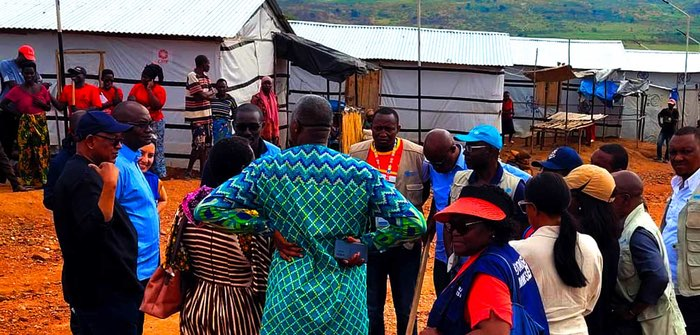
The delegation led by Yero Baldeh (seen from behind) met representatives from the main Burundian authorities, including the Finance Minister, Nestor Ntahontuye and his counterpart Martin Ninteretse, Minister of the Interior and Public Security.
A high-level delegation from the African Development Bank, led by Yero Baldeh, Director of the Transition States Coordination Office, visited Bujumbura from 14 to 17 May 2025. The mission was a core part of a regional dialogue and aimed to establish the terms of the Bank Group’s technical and financial support for an urgent and long-term response to the security crisis in the eastern Democratic Republic of Congo (DRC).
“We came to find out about the efforts made by all sides in managing the negative consequences of the crisis affecting both the DRC and its neighbours. My primary objective is to look, listen and engage with Burundi’s development partners to gain a better understanding of their actions and assess the support the Bank may be able to offer, each in their own field of activity,” commented Mr Baldeh at the start of the mission.
During its visit, the Bank delegation, accompanied by Pascal Yembiline, the African Development Bank’s Country Manager for Burundi, met representatives from the country’s most senior authorities. Delegates held talks with Martin Ninteretse, Minister of the Interior and Public Security, Nestor Ntahontuye, Minister of Finance, and a senior representative of the Minister of National Solidarity and Social Protection. Their discussions covered hosting and the provision of assistance to Congolese refugees, integrating refugees, the development of a regional response plan for refugees from the DRC and aligning these actions with Burundi’s humanitarian and development priorities, as the main host country for people affected by the conflict.
“The needs are there. It is difficult to imagine the pressure exerted by the arrival of 45,000 new inhabitants in areas already facing social, economic and climate-related challenges,” pointed out Mr Ninteretse. He encouraged the Bank and other partners to invest in sustainable solutions, relying on the legendary hospitality of the Burundian people, who see any visitor as a blessing, even if families’ capacities to welcome more people are already saturated.
“We want to thank the Burundian authorities for acting as a good neighbour, by welcoming and granting asylum to refugees from the DRC. Despite the uncertainty associated with the cuts to humanitarian and development aid by leading donors, Burundi has managed to take on a significant level of administrative, security, social and budgetary responsibility in record time,” said Mr Baldeh. He informed his hosts that the African Development Bank was supporting Chad with the Sudanese crisis and would do the same with Burundi. “We will examine the solutions proposed by Bujumbura and its partners, potentially including an integrated response plan, to decide on the nature of the support to be provided to foster sustainable responses that will benefit refugees, internally displaced persons and host communities,” promised Mr Baldeh.
Faced with the arrival of a new wave of refugees in addition to those it took in over 20 years ago, Burundi is benefiting from the support of its development partners – both bilateral and multilateral – including United Nations organizations, development cooperation agencies, and other international organizations, including the International Conference on the Great Lakes Region (CIRGL), one of the regional coordination pillars dealing with the crisis in the eastern DRC.
Several approaches were agreed during the discussions: the gradual integration of refugees into local communities via vocational training and access to micro-credit, the deployment of regional programs designed to strengthen the resilience of women and young people while preventing cross-border conflicts, and launching pilot projects intended as points of reference for future humanitarian crises.
“We want to provide a sustainable response to the need for survival and long-term resilience,” insisted the development partners. The various deliberations ended with a positive agreement with the government to launch an in-depth evaluation of the proposed response to be submitted by the government in the next few weeks, alongside an analysis to be carried out by a multidisciplinary working group. This will lay the foundations for an operational action plan, with clear milestones to guarantee swift and flexible implementation of the approved solutions.
The African Development Bank mission concluded its trip with field visits to the integration centre for displaced persons in Gateri and the refugee transit centre in Cishemere, both in the north-west of the country. In Bujumbura, it visited the East African Nutrition Sciences Institute (EANSI), a regional initiative supported by the Transition States Coordination Office, which welcomes young people from Burundi and cross-border countries, particularly the eastern DRC.
The Transition States Coordination Office is a specialist department of the African Development Bank Group responsible for coordinating the Bank’s strategic and operational commitments in “transition states”, i.e. countries undermined by political instability, institutional weakness, armed conflict, or vulnerability to climate and economic shocks. The Office is an agile, partnership-based unit that strengthens the Bank’s impact in these states, by combining contextual analysis, risk management and the development of multisectoral strategies in consultation with governments and regional partners. (End)
